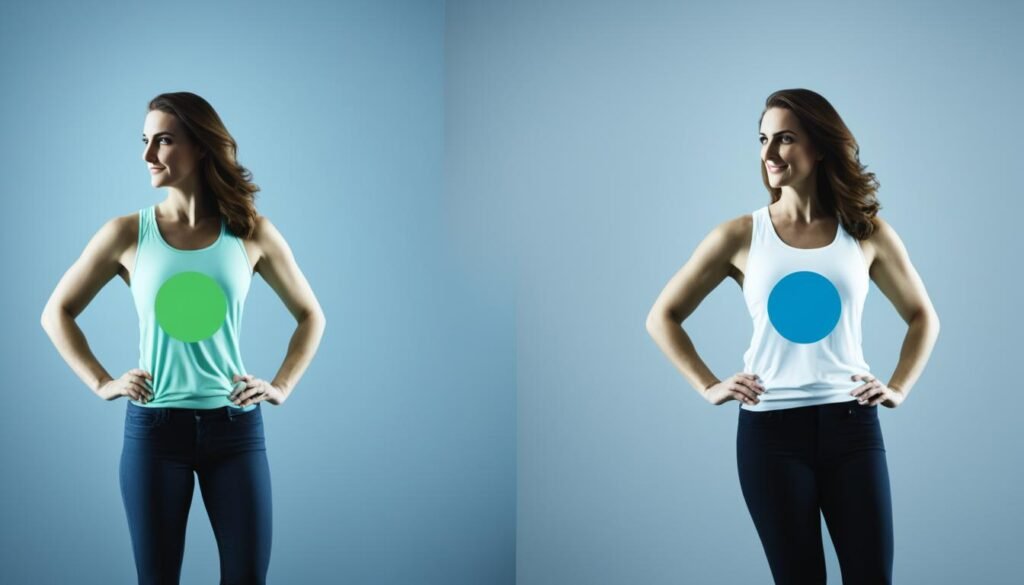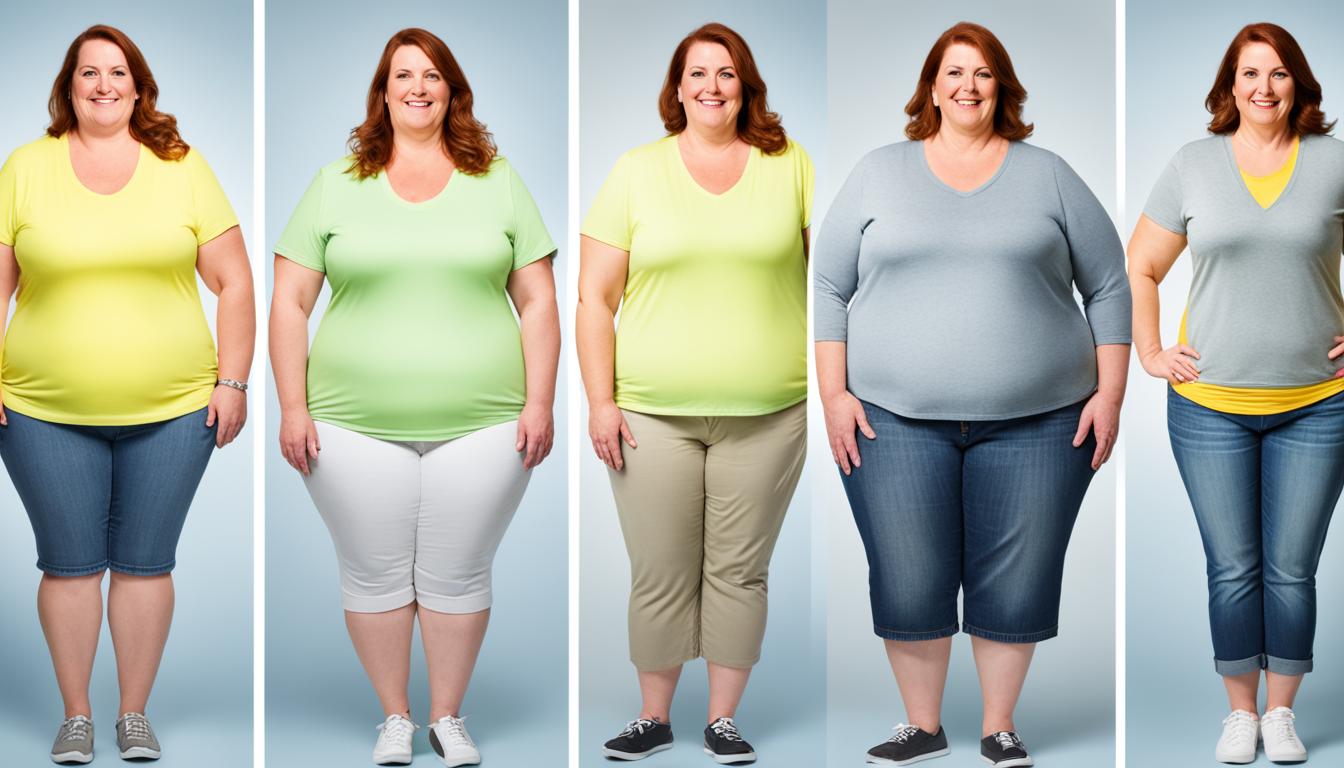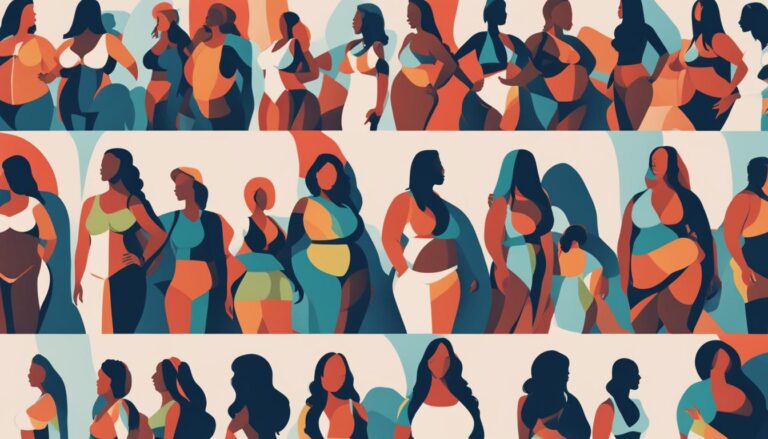How much weight loss makes you more attractive?
Hello, I’m here to explore the fascinating connection between weight loss and attractiveness. We all strive for an attractive appearance, and achieving a weight loss transformation is often a part of that journey towards our ideal body weight. But how much weight loss is needed to truly enhance our aesthetic appeal and increase our physical attractiveness?
Researchers have discovered that when it comes to weight loss and its impact on attractiveness, the changes are most noticeable in the face. In fact, it takes a weight change of about 1.33 points in BMI (Body Mass Index) for others to notice a difference in our looks. For women, this translates to an average weight loss or gain of eight pounds, and for men, it’s about nine pounds.
However, it’s important to note that just because others notice a weight change doesn’t necessarily mean they will find us more attractive. To truly enhance our aesthetic appeal, we would need to lower our BMI by about 2.5 points. This translates to a weight loss of around 14 pounds for women and 18 pounds for men. The most attractive faces were found to correspond to a BMI of about 19 for women and 24 for men.
So, while some weight loss may make us more noticeable, it’s the significant transformation that truly improves our attractiveness. Now, let’s dive deeper into the relationship between facial adiposity and attractiveness.
Key Takeaways:
- A weight change of about 1.33 points in BMI is needed for others to notice a difference in our looks.
- To enhance our aesthetic appeal, we would need to lower our BMI by about 2.5 points.
- Significant weight loss of around 14 pounds for women and 18 pounds for men can improve our attractiveness.
- The most attractive faces correspond to a BMI of about 19 for women and 24 for men.
- Weight loss doesn’t guarantee attractiveness, but it can play a role in achieving an attractive appearance.
The relationship between facial adiposity and attractiveness
Facial adiposity, or the amount of fat in the face, serves as a crucial indicator of a person’s body mass index (BMI) and overall health. Research has shown that increased facial adiposity is associated with a compromised immune system, poor cardiovascular function, frequent respiratory infections, and increased mortality rates.
Studies have further revealed that a change in BMI of approximately 1.33 points is required for noticeable differences in facial adiposity to be perceived by others. To enhance perceived attractiveness through weight loss, a decrease of 2.38 kg/m2 for women and 2.59 kg/m2 for men is needed, which translates to around 14 and 18 pounds respectively.
This suggests that women’s facial attractiveness may be more sensitive to changes in weight, emphasizing the importance of maintaining a healthy body composition for both physical well-being and aesthetic appeal.
Impact on Health Indicators
The link between facial adiposity and health extends beyond mere attractiveness. Excess facial fat can indicate an increased risk of various health issues, including compromised immune function and impaired cardiovascular health. By reducing facial adiposity, individuals can improve their overall health and reduce the likelihood of developing these health conditions.
Compromised Immune System and Cardiovascular Function
The presence of excessive facial fat is often indicative of a compromised immune system. Research suggests that individuals with increased facial adiposity are more susceptible to respiratory infections and may experience a longer recovery period.
In addition, excess facial fat is associated with poor cardiovascular function. High levels of facial adiposity can contribute to the accumulation of visceral fat, which puts strain on the heart and compromises its ability to function optimally. This in turn increases the risk of cardiovascular diseases such as heart attack and stroke.
Perceived Attractiveness
Perceived attractiveness plays a significant role in social interactions and self-confidence. Studies have consistently shown that individuals with lower facial adiposity are generally perceived as more attractive. By reducing facial fat through a healthy weight loss regimen, individuals can enhance their physical appearance and boost their self-esteem.
It is important to note that weight loss should be pursued in a balanced and sustainable manner, focusing on overall health rather than solely on aesthetic goals. Striving for a healthy body composition and maintaining a well-rounded lifestyle can lead to improvements in both attractiveness and long-term well-being.
| Health Indicators | Effects of Excess Facial Adiposity |
|---|---|
| Compromised Immune System | Increased susceptibility to respiratory infections and longer recovery periods. |
| Cardiovascular Function | Strain on the heart, impaired function, and increased risk of cardiovascular diseases. |
| Perceived Attractiveness | Lower attractiveness levels associated with higher facial adiposity. |
The impact of weight loss on attractiveness perception
A study conducted on attractiveness perception reveals that women have the ability to accurately assess a man’s body mass index (BMI) based on the amount of facial fat he carries. In order to be perceived as more attractive, men should aim to lose about 8.2kg, while women should strive to shed around 6.3kg. However, it’s important to note that weight loss not only improves attractiveness but also comes with a multitude of health benefits.
When individuals embark on a weight loss journey, their facial fat reduction is just one noticeable change. Alongside improvements in attractiveness, weight loss has been associated with enhanced immune function and better cardiovascular health. This demonstrates that shedding excess body weight goes beyond aesthetics and positively impacts overall well-being.
Nevertheless, the motivation to lose weight for the purpose of enhancing attractiveness can serve as a powerful incentive. Concrete goals with specific numbers attached tend to be more motivating than abstract ambitions. By setting measurable targets, individuals can track their progress and stay motivated throughout their weight loss journey.

The Relationship Between Weight Loss and Attractiveness
Research has shown that weight loss can significantly influence how individuals perceive attractiveness. When individuals lose weight, particularly in the facial region, their overall appearance can become more symmetrical and defined, which contributes to a heightened sense of attractiveness.
“Weight loss not only improves attractiveness but also has several health benefits, such as improving immune function and cardiovascular health.”
Not only does weight loss impact physical appearance, but it also boosts self-confidence, which can further enhance perceived attractiveness. By achieving concrete weight loss goals and experiencing the accompanying physical changes, individuals may feel more confident in their own skin, radiating an appealing aura.
The Role of Motivation and Concrete Goals
When it comes to weight loss, motivation plays a crucial role in achieving success. The desire to be more attractive can be a strong motivating factor for individuals looking to embark on a weight loss journey. By setting concrete goals, such as losing a specific amount of weight, individuals can create a roadmap to follow and consistently work towards their target.
Motivation derived from enhancing attractiveness can be further bolstered by the numerous health benefits associated with weight loss. Knowing that weight loss promotes immune function and cardiovascular health, individuals can stay motivated not only for aesthetic reasons but also for overall well-being.
Incorporating Weight Loss into Lifestyle
To effectively achieve weight loss and improve attractiveness perception, individuals should adopt a holistic approach that considers both diet and exercise. Incorporating a balanced and nutritious diet helps support weight loss efforts while providing essential nutrients for optimal health.
In terms of exercise, individuals should focus on activities that burn calories and build muscle. This can help create a more sculpted and toned physique, further enhancing perceptions of attractiveness.
Additionally, finding support systems, such as training partners or support groups, can provide an added layer of motivation and accountability throughout the weight loss journey.
Tips for Successful Weight Loss
To achieve successful weight loss, it’s important to stay motivated and have a clear plan. Here are some weight loss tips to help you on your weight loss journey:
- Find Motivation: Set specific goals for yourself and find what inspires you to stay committed. Whether it’s improving your overall health, increasing your energy levels, or fitting into your favorite clothes, having a clear motivation can keep you focused.
- Follow a Healthy Diet: Incorporate a balanced and nutritious diet that supports weight loss. Focus on whole, unprocessed foods that provide essential nutrients while keeping you satisfied. Include plenty of fruits, vegetables, lean proteins, whole grains, and healthy fats in your meals.
- Incorporate Regular Exercise: Make exercise a regular part of your routine. Engage in activities that burn calories and build muscle, such as cardio exercises, strength training, and flexibility exercises. Aim for a minimum of 150 minutes of moderate-intensity aerobic activity or 75 minutes of vigorous-intensity aerobic activity each week.
- Consider Training Partners or Support Systems: Find a training partner or join a support group to increase accountability and motivation. Having someone to exercise or share your weight loss journey with can provide valuable support and encouragement.
Remember, weight loss should be approached with the goal of improving overall health and well-being, rather than solely focusing on attractiveness. By creating a sustainable plan and incorporating these weight loss tips, you can achieve successful and long-lasting results.
Conclusion
Weight loss plays a crucial role in enhancing both attractiveness and overall health. While specific weight loss targets have been identified to improve attractiveness, it’s important to acknowledge that beauty is subjective and personal goals may differ. However, prioritizing weight loss for health reasons, such as strengthening the immune system and promoting cardiovascular well-being, can provide additional motivation.
The ultimate aim of weight loss should be to improve overall well-being and feel confident and comfortable in one’s own skin. By focusing on personal goals and striving for a healthy weight, individuals can achieve a sense of empowerment while reaping the physical and psychological benefits of weight loss. Embracing a comprehensive approach that incorporates nutritious diet choices and regular exercise is key to achieving sustainable results.
As individuals embark on their weight loss journey, it’s important to remember that the path to a healthier and more attractive appearance is unique for each person. While weight loss can significantly impact one’s attractiveness, it should always be approached with the goal of enhancing overall well-being and self-confidence. By prioritizing health, setting realistic personal goals, and remaining dedicated to a holistic lifestyle, individuals can achieve their desired weight loss transformation and enjoy the benefits it brings to their lives.
FAQ
How much weight loss is needed to become more attractive?
Research suggests that a weight change of about 1.33 points in BMI is needed for others to notice a difference in your looks. This translates to an average weight loss or gain of eight pounds for women and nine pounds for men. However, to enhance your aesthetic appeal, you would need to lower your BMI by about 2.5 points, which equates to a weight loss of around 14 pounds for women and 18 pounds for men.
Does weight loss affect facial attractiveness?
Yes, facial adiposity, or the amount of fat in the face, is an accurate indicator of a person’s body mass index (BMI). Increased facial adiposity is associated with a compromised immune system, poor cardiovascular function, and frequent respiratory infections. A change in BMI of approximately 1.33 points is required for others to notice a difference in facial adiposity. Moreover, a decrease of around 14 pounds for women and 18 pounds for men is needed to make faces appear more attractive.
Can weight loss improve attractiveness for men and women?
Yes, a study found that women can accurately judge a man’s BMI just by the amount of facial fat he carries. To be perceived as more attractive, men need to lose about 8.2kg, while women need to shed around 6.3kg. Weight loss not only improves attractiveness but also has several health benefits, such as improving immune function and cardiovascular health.
What are some tips for successful weight loss?
To achieve successful weight loss, it’s important to stay motivated and have a clear plan. Here are some tips to help you on your weight loss journey: set specific goals and find what inspires you, follow a healthy diet that supports weight loss, incorporate regular exercise into your routine, and consider finding a training partner or joining a support group for increased accountability and motivation.
Should weight loss be solely for attractiveness?
No, weight loss should be approached with the goal of improving overall health and well-being, rather than solely for attractiveness. While weight loss can have a positive impact on both attractiveness and health, beauty is subjective, and personal goals may vary. Prioritizing weight loss for health reasons, such as improving immune function and cardiovascular health, can provide added motivation.






